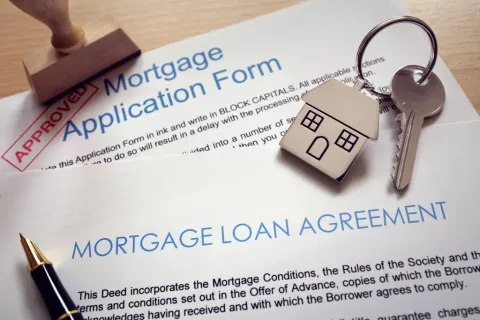What Are the Loan Modification Requirements in Illinois?
Loan Modification Requirements Explained
When the market crashed and people started losing their houses to foreclosure, loan modification became a hot topic to many homeowners. It caught on like wildfire, and many found themselves asking, “What are loan modification requirements?”
Today we’re talking about loan modification requirements. If you’re late paying your bills and fear that foreclosure or bankruptcy is inevitable, then a loan modification may be the answer to your problems. Let’s learn more about what those requirements are. Keep reading to learn more.
Basics Of Loan Modification
A loan modification is when a lender adjusts the terms of an existing loan. It may take the form of a lower interest rate, an extension of the repayment period, a switch to a different type of loan, or a combination of the three.
These modifications are frequently made as a result of the borrower’s inability to repay the original loan. The majority of successful loan modification negotiations take place with the assistance of an attorney or a settlement business. Certain borrowers may be eligible for federal loan modification aid.
Important Takeaways
A loan modification is often granted to a borrower who is experiencing financial difficulty and cannot pay back the loan according to its original terms.
Typically, successful candidates retain the services of legal or other professional counsel.
Certain consumers have access to government assistance programs for mortgage holders.
A lender may agree to a loan modification throughout a settlement or in the event of a possible foreclosure. In certain instances, the lender has determined that a loan modification will be less expensive for the firm than foreclosure or charge-off.
A loan modification is not synonymous with forbearance. A forbearance arrangement provides temporary respite to a borrower who is experiencing a temporary financial difficulty. Loan modification agreements are intended to be long-term in nature.
A loan modification may include a lower interest rate, a more extended repayment period, a change in the type of loan, or any combination of these.
There are two expert aid options available while negotiating a loan modification:
- Settlement businesses are for-profit entities that negotiate with creditors on behalf of borrowers to reduce or eliminate debt.
- Mortgage modification attorneys are experts at negotiating on behalf of homeowners whose mortgages are in default and at risk of foreclosure.
Programs for a loan modification
Some lenders and servicers provide loan modification options that can be temporary or permanent.
You may be qualified for alternative programs that can help you modify or refinance your mortgage if your lender does not have one.
The federal Home Affordable Modification Program ended in 2016. The Flex Modification program, launched by Fannie Mae and Freddie Mac on Oct. 1, 2017, aims to prevent foreclosures. This program may be available if your mortgage is owned or insured by Fannie or Freddie.
The government Home Affordable Refinance Program (HARP) assisted underwater homeowners in refinancing. HARP is also gone. HARP was replaced in 2019 by High Loan-to-Value Refinance Option and Enhanced Relief Refinance.
How Does a Loan Modification Work?
A loan modification is a contract between you and your lender. The details of the agreement are negotiated between you and the lender. You make a list of all the modifications you wish to make to your loan.
You agree to make them. In return, the lender agrees to change your terms.
The lender’s terms are the part of the agreement that it signs. These are sometimes called “modifications.”
A loan modification agreement is a contract. If you sign it, you agree to the changes the lender makes. These may include the interest rate or the monthly payment. If you go back and forth with the lender, it may say the changes it makes to your agreement are “options” that it may exercise.
Lenders are generally prepared to modify loan terms because foreclosure is more costly and time-consuming. Depending on the lender and program, you could:
- Reduce your mortgage rate by one or two points to reduce your monthly payment. Ask if the interest rate will rise again. According to some lenders, your interest rate and monthly payment would steadily climb throughout the loan duration.
- Longer mortgage terms mean cheaper monthly payments, which can help you stretch your budget. But you’ll pay more interest over time.
- If you have an ARM (alternative to a fixed-rate mortgage), and your payments fluctuate, your lender may agree to a fixed-rate loan. Your payments may become more predictable and affordable due to the fixed rate.
- Reduce your loan’s principal: Your lender may reduce your loan’s principal, so you repay less. This is an unusual adjustment because it offers the borrower free equity. If you’re given this choice, find out if the principal is taxable.
What Are Loan Modification Requirements
No laws expressly state who is eligible for a loan modification and who is not. However, lenders typically use the same principles and criteria when determining whether to modify a borrower’s loan.
Generally, most lenders consider the following:
- Your financial situation. The servicer will assess your income, loan payment history, and financial situation as part of the review process.
- Whether you are experiencing legitimate economic hardship, almost usually, lender standards require the borrower to have encountered a problem that rendered the current payment amount untenable. A genuine financial hardship is an unforeseen or uncontrollable event, such as the death of a co-borrower, job loss, or divorce.
- Financial capability. Creditors want to verify that you have a steady income stream, even if it is less than it was when you took out the loan. For instance, a borrower who has re-entered the labor force following a period of unemployment may qualify for a modification that reduces monthly payments.
The specific criteria that a borrower must meet differ by lender. Depending on your loan type and circumstances, you may be eligible for a Fannie Mae or Freddie Mac modification, an FHA modification, or a proprietary (in-house) modification.
Understanding loan modifications might help you assess your eligibility. Here’s how to obtain one:
Contact your lender.
Discuss loan modification and other payment help options with your loan servicer. Explain why you’re behind on payments and how you plan to catch up.
Ask about the next actions and required papers if you qualify for a loan modification. Seek the help of a reliable load modification attorney to help you with your case.
Confirm your financial situation.
The lender will require verification of your finances. To display your income and costs, gather your:
- Receipts
- Cheques
- Bills each month
- Asset records
- You may also need to comply with an IRS Form 4506-T, allowing your lender to examine your tax records.
- Write a hardship letter explaining how you fell behind on payments and how you plan to catch up. Your other records should back this up.
Apply.
It takes around weeks from start to finish. The lender should respond in 30 days.
Before you sign off on the mortgage modification, be sure you understand how the lender will report your account to the credit bureaus.
Pass the trial period.
To make sure you can afford the additional monthly payment, the lender may impose a three-month trial. You can permanently adjust your loan terms if you make three timely payments.
Refinance Vs. Loan Modification
Refinancing is frequently the first course of action for homeowners seeking a lower monthly mortgage payment.
Refinancing enables you to exchange your current loan for one with a cheaper interest rate and a longer duration. This may lead to a permanent reduction in mortgage loan payments without hurting your credit score negatively.
Therefore, debtors who are experiencing financial hardship may be unable to refinance. They may have difficulty qualifying for the new loan due to decreased income, decreased credit score, or unforeseen debts (such as medical expenses). The homeowner may be qualified for a mortgage loan modification in these instances.
Typically, loan modification is intended for homeowners who cannot refinance their mortgage due to financial difficulties.
Mortgage modification is often reserved for customers who do not qualify for refinancing and have exhausted all other available choices for mortgage relief. A loan modification is a method in which you engage with your current bank or lender to adjust the conditions of your existing mortgage.
If you’ve defaulted on an existing mortgage, the likelihood is that your credit has been damaged to the extent where a new lender would be hesitant to provide you with a new loan.
Generally, refinancing is not an option in this case.
As a result, there is no genuine competition between a loan modification and refinancing. The best course of action for you will depend on the status of your present loan, your personal resources, and the terms agreed upon by your mortgage lender.
Modification Vs. Suspension
Servicers can also help borrowers by forbearing payments. To help homeowners get back on track, loan forbearance suspends mortgage payments.
During the COVID pandemic, many homeowners who lost employment or income may request forbearance for up to a year. Unlike forbearance, mortgage loan modification permanently alters a loan’s rate or terms. Mortgage relief plans that include forbearance and loan modification can be more successful.
Those unable to pay their mortgage after the forbearance period may be granted a permanent loan modification.
An unpaid principal may be deferred until the conclusion of the repayment period if a homeowner is authorized for a mortgage modification.
Loan Modification Frequently Asked Questions
What happens when a loan is modified?
A loan modification is intended to assist a homeowner in catching up on past-due mortgage payments and avoiding foreclosure. If your servicer or lender agrees to a home loan modification, you may be able to reduce your monthly payment, extend or shorten the duration of your loan, or lower your interest rate.
How long will it take for a loan modification to take effect?
According to financial and insurance expert Karen Condor, the loan modification process typically takes between one and three months. Once authorized, the modifications to your interest rate and loan terms are permanent.
Is loan modification detrimental to your credit?
A modification of your mortgage loan under some government programs will not affect your credit.
However, some loan modifications may have a detrimental effect on your credit and appear on your credit record. However, because a mortgage must typically be in default before you can request a modification, your financial issues are almost certainly already shown on your credit report.
Is it possible to be denied a loan modification?
Yes. A mortgage loan is a legally binding contract, and the mortgage lender is not required to consent to a loan modification.
What is the cost of modifying a mortgage?
While mortgage modifications are not subject to closing fees, your lender may charge a processing fee.
Are loan modifications subject to repayment?
Repayment of a loan modification will vary according to the type of modification granted. On the backend of your loan, your lender can apply a reduced interest rate to the principle that you must repay later.
With a principal deferral loan modification, your lender reduces the amount of principal paid every month.
However, the principle postponed by your lender will become payable when your loan matures or the home is sold.
Hiring a Loan Modification Attorney
The modification process is complicated; their rules are often hard to understand. Lenders are careful to make sure that any modification they agree to is enforceable. A lawyer can make sure the lender follows the law. And a lawyer can help you negotiate.
Negotiation with a mortgage lender can be grueling, and you need a lawyer on your side, even if you are negotiating on your behalf. When the negotiation fails, a lawyer can help you take the case to court.
Such a hearing can be intimidating, and a lawyer knows which questions to ask to make the judge understand your situation.
Yes. Getting professional help for loan modification requirements is a smart move. If your lender is dragging its feet, you will often be able to get some relief if you hire a lawyer.
When you hire our firm, Cutler & Associates, Ltd., you get all of that. Consult with our loan modification and bankruptcy attorneys in Chicagoland today for a free consultation.



